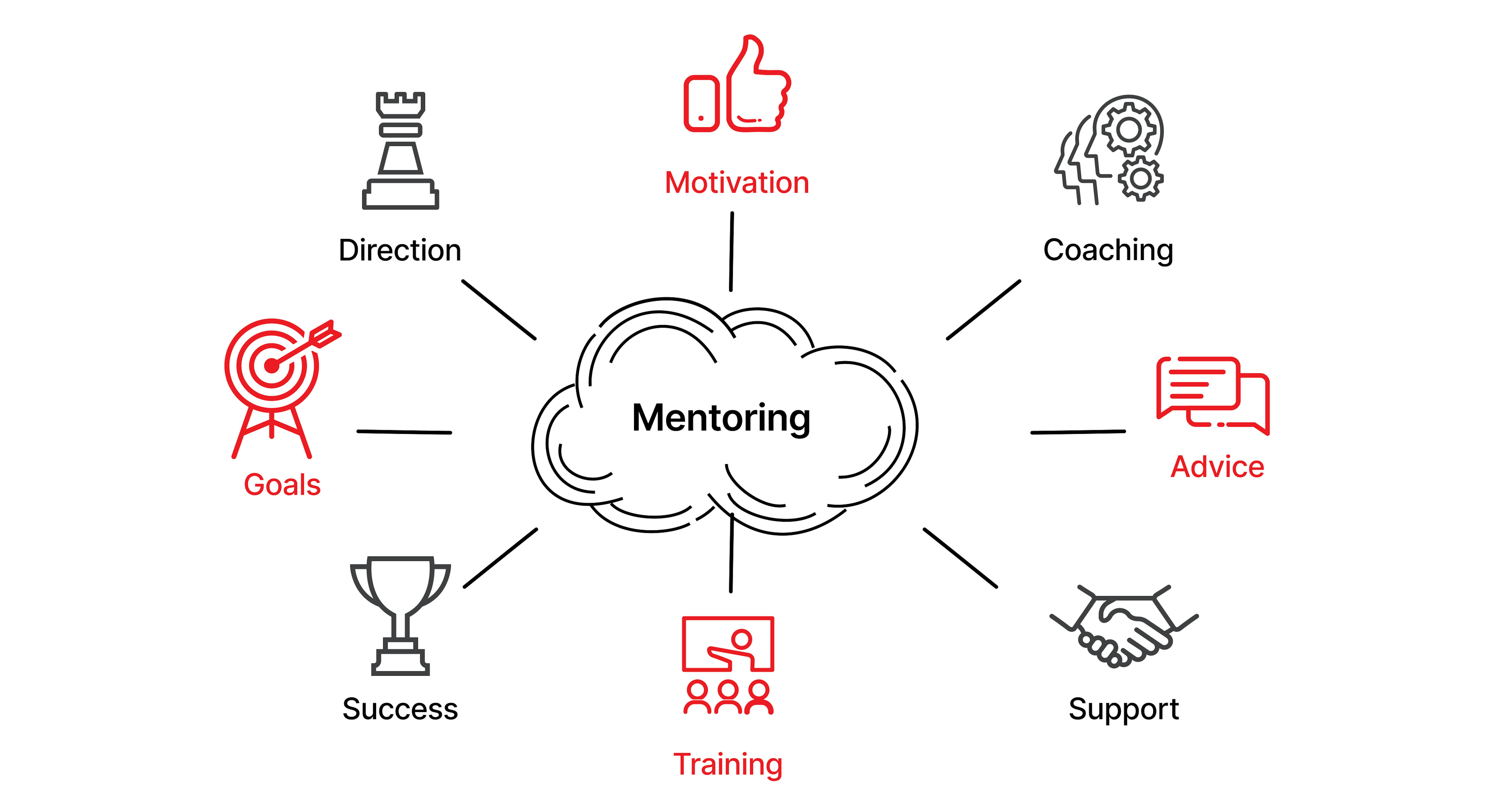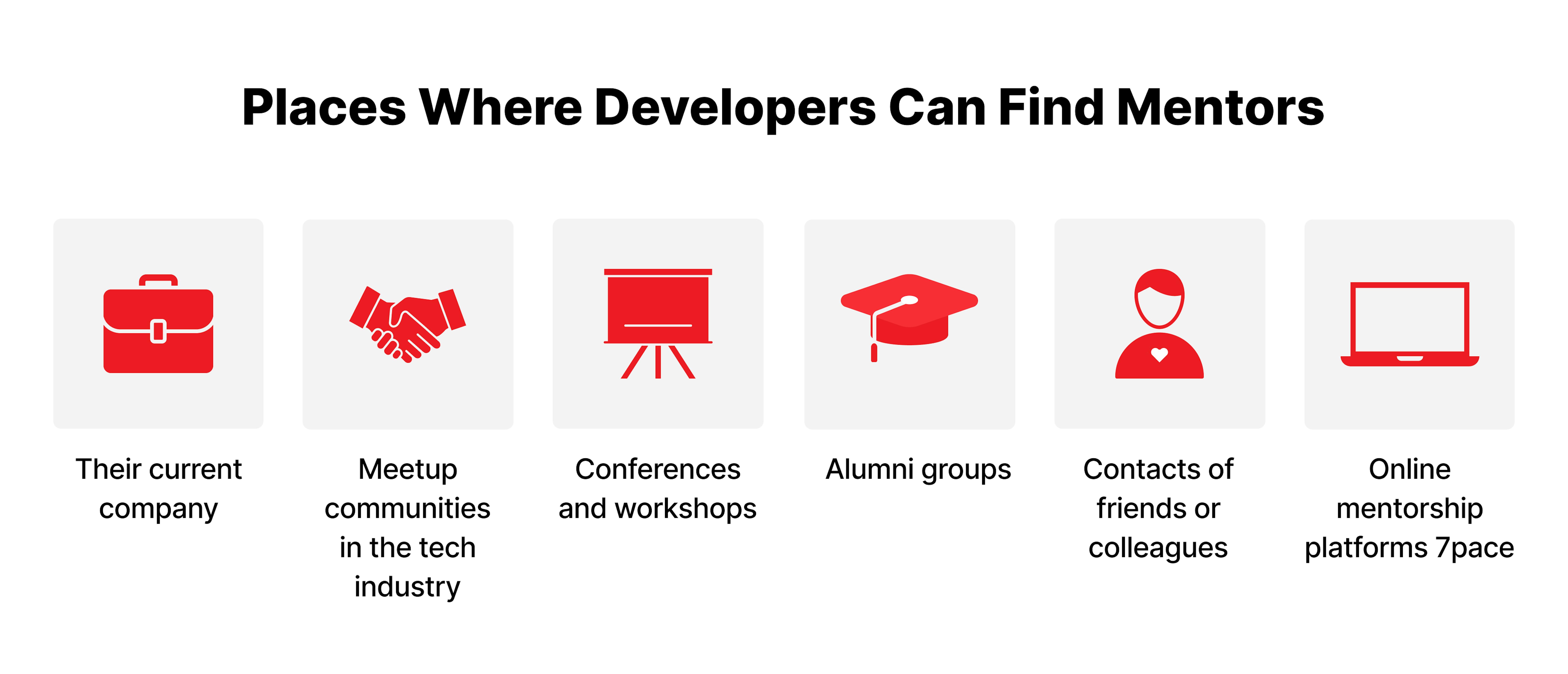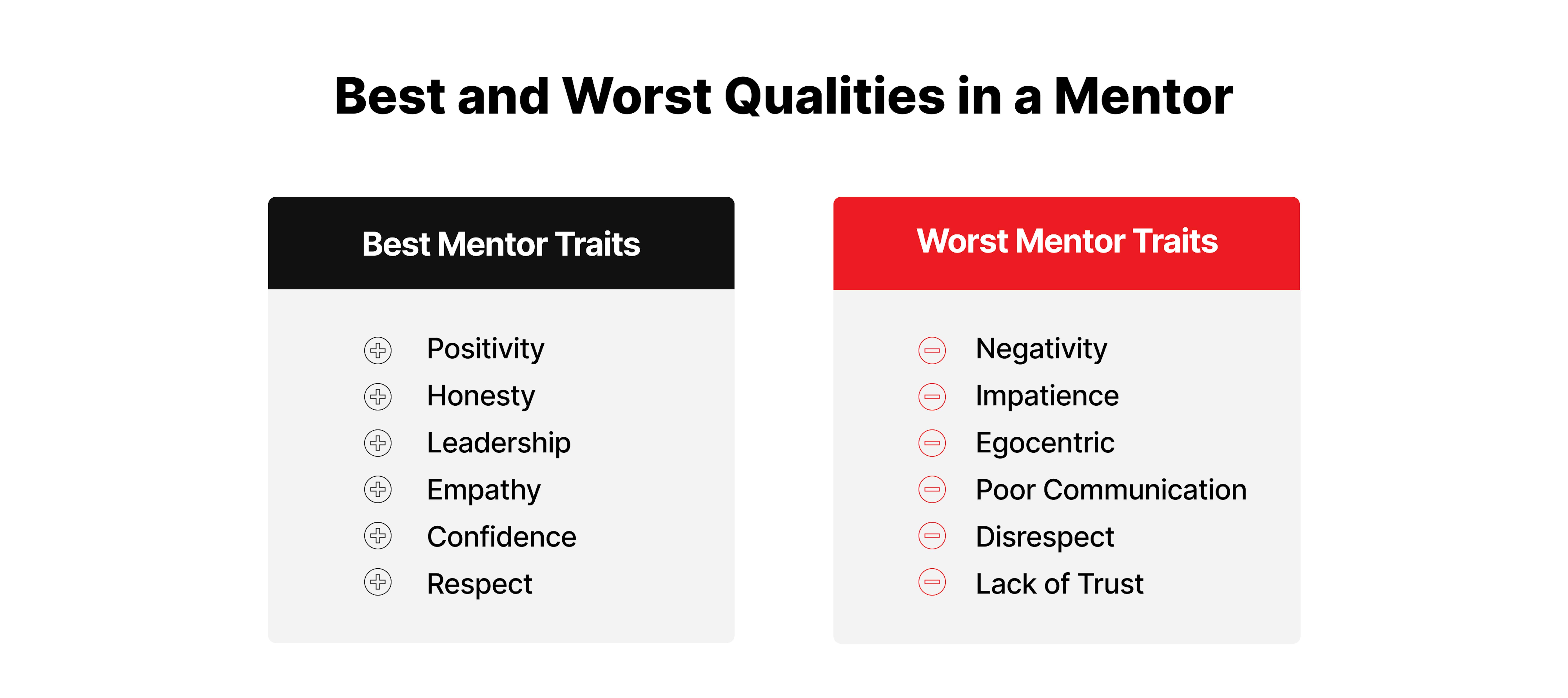Analyze with AI
Get AI-powered insights from this Mad Devs article:
The complexity of the IT field can be daunting. Despite the lack of qualified developers, many software engineering companies are still implementing mentorship programs. They believe it can help them attract and retain their best talent. And there are objective reasons for that.
Through mentorship, new developers can quickly learn the company's culture and processes, which can help them develop their skills and deliver high-quality products. It requires constant learning and development, and it can leave little time for professional development. Especially if you don’t have a trusted advisor. Having a mentor or coach can help you navigate through the various steps of your career. It is the opportunity to identify areas of expertise and improve your skills. Moreover, they can also help you plan for long-term success.
In this article we will discuss his/her responsibilities, benefits of having IT mentor and where to find him/her.

Who is a software developer mentor?
A mentor is someone who is more experienced in software development and who is helping you reach your goals.
Aside from being a coach or teacher, a mentor also takes a passive role in helping developer improve job skills and overcome obstacles in different tasks. He or she usually doesn’t provide just lectures, but they can help guide you through your learnings. People with a mentor tend to be very self-directed and are often successful in their careers.
There are so many ways that a software engineer mentor can benefit a developer. We’ll talk about five main ways that a mentor can help a less-experienced developer grow and develop.
Reasons why developers need mentors
1. To teach coding best practices
One of the most important things that a mentor can do is pass along their knowledge and skills. This is especially important for mentoring junior developers, since new developers as there's always room for improvement.
Coding mentor regularly review and revise the software development codes. Doing so helps ensure that the code is working properly. Having a mentor who has been through the same experience can help them provide sound advice.
Being a mentor can also be beneficial for developers who work in an organization where there are various team members' preferences and quirks. Your mentor can help you develop a strategy to fit their needs.
2. To improve skills
It's also important to have someone who can honestly point out areas of improvement that you might need to work on. Having a mentor helps you realize areas of improvement that you might not have noticed or know about. Mentoring software developers means that you have the necessary skills and experience to guide your mentee toward getting better.
3. To provide the right resources to grow
A good programming mentor can also refer to courses or programs that can help their mentee improve their skills. This can help them gain a deeper knowledge base as they work on different types of codes.
Ideally, a mentor knows exactly what resources are right for their mentee's needs. He/she should also know what classes, programs, bootcamps and other training options are appropriate for their particular needs.
4. To offer new perspectives
Mentor's experience can be used to help guide you through the changes that are bound to happen in your career and take advantage of the opportunities that the tech industry has to offer. Having IT career coach who has been through the same path can help prepare you for the changes that are coming.
Although they may be in the same field, their experiences and perspectives are different. Having someone who has taken a different path can help you learn from their mistakes and successes.
5. To help grow personally
Aside from being a professional, a good mentor also help you develop as a person. As their relationship develops, they should also be regarded as a trusted friend and ally. They also help shape your goals, develop strong relationships with others, and work efficiently in the office.
Benefits of developer's mentorship for company
1. Employee career development
One of the most effective ways to retain a good software engineer is by having a career mentor. This type of relationship allows employees to align their goals with the company's.
Through mentorship, software developers are encouraged to take on more responsibility for their own growth. This will help create a more productive and happy work environment.
2. Creation of inclusive workplace
An inclusive work environment is also beneficial for software developers as it allows them to break new ground and develop ground-breaking ideas. A group of software developers with a diverse background is more likely to grow and contribute to an organization's success. This type of environment also encourages the retention of valuable talent.
For example, Mad Devs had an effective internship program for a long time, at the end of which many graduates became part of our team:
The concept of a mentoring circle is also becoming more popular as it allows employees to connect with like-minded individuals who share similar goals and interests. This type of mentorship helps employees grow as a team.
3. Leadership development in team members
Another vital factor is that a successful mentorship program can help with is employee’s leadership development. Through intentional coaching, young developers can develop their expertise and leadership skills, which can help keep them in the company and its workforce. And already experienced programmers in the company can develop their software skills and act as mentors. This is a great opportunity for them to grow from a senior developer to a teamlead, for example. Also it will help boost employee loyalty and increase productivity.
Where to find coding mentors?
Since we have identified the unconditional benefits of having a mentor, both for employees and for the company as a whole, now a logical question arises - where do these mentors reside and how to find them. Here are examples of places where to start:

- Current workplace
Ideally, you'll look for a mentor at your current company, as they'll already know you and have access to your work. They will also be able to provide guidance when needed. - Meetup communities, conferences, coding workshops
There are plenty of opportunities to connect with like-minded individuals in the tech industry through local meetup groups. People who are passionate about sharing their knowledge are usually the main contributors to coding workshops, conferences, and other similar events. You can start by finding a group that fits with your goals, regularly attend the sessions and build connections with like-minded individuals. - Open-source communities
Getting involved with an open-source project can also help in the search for a potential mentor. Before you start, identify the project that interests you and get started contributing.
Once you are part of an open-source project, you will start interacting with the other contributors and maintainers. Eventually, this will help you identify potential mentors. - Alumni groups
If you attended a courses, bootcamp, university that has an alumni network, it can be a great place to find other developers who graduated before you. Try use social networks and LinkedIn. - Contact friends
If you can't identify a mentor, then the next step is to ask your friends if they have any software developers who could be a good mentor for you. Ask around and see if anyone is willing to meet with you. - Mentor online platforms
Online mentorship platforms are also available for software developers. Some of these are free and some are paid, but they can also help you find a mentor.
Here is the list of popular platforms:
For 1-on-1: CodeMentor.io, Coding Coach, or Mentor Cruise.
To discuss with peers & mentors your projects, code and get feedback: CodeProjects, FrontendMentor.io, Exercism.io, or Codewars.
There are also two important parts that are worth mentioning. Let's discuss some practices for being a good mentor and for a mentee.
| Ten Tips for a Successful Mentoring | |
|---|---|
| Be interested | Take the time to be interested in the life of your mentee. Before you start a relationship, take the time to thoroughly understand the person's goals and aspirations. This will allow you to guide and support them in achieving those goals. |
| Communicate, not control | You need to be on the same page with your mentee. They have the power to make their own career path, and you are there to support them along the way. Don't try to convince them that they need to change their direction. Instead, get them to talk openly about their goals and experiences. |
| Give inspiration with first project | Ideally, start with a project that is easy to ace. Doing this will give your mentee the confidence and enthusiasm needed to support and motivate your mentee during times of struggle. Varying tasks and deadlines may make it hard to motivate and sustain the relationship. |
| Allow making mistakes | Your goal should be to let your mentee reach their own conclusions. This will allow them to make their own decisions and reach reasonable conclusions. Having the confidence to believe in them will help build their trust and confidence. |
| Be empathic | Being an empathic person is very important in any relationship, especially when it comes to software engineers. Being able to support and listen to your mentee's feelings will help build a stronger bond. Being able to identify the differences between them will help you become more attuned to their needs. |
| Be constructive critic | Don't try to put them down or break their confidence. Instead, try giving them constructive criticism without causing them any hurt. If they start to be defensive, try supporting them by asking them to listen to you. |
| Don't give just answers; give resources | Mentorship is about helping your mentee grow into their goals, and it doesn't involve telling them how to do their work. Instead, it's about providing them with resources that can help them reach their goals. |
| Share network, provide contacts | Getting to know your network is very important in order to get the most out of your time as a mentor. As a software engineer, it's also important to introduce your new mentee to your circle. Having them in your circle will allow them to connect with other developers and industry leaders. |
| Check-in on mentee | One of the most important steps in establishing a good relationship is to regularly check-in with your mentee. This will help build their confidence and allow them to feel like they can always rely on you. |
| Professionalism first | You want to make sure that your interactions with your mentee are professional and maintain mutual respect. The person should be able to keep their conversations private. Doing so will help build a safe space for them. |

Tips for being good mentee
- Mentor is a guide, so it's important that you set realistic expectations. Having expectations can help avoid awkward situations and make the relationship more successful.
- Your mentor is a volunteer, so it's important to remember that they are there for you when you need them most. They are there to help you grow and develop, and they will take time out of their schedule to do so. As a mentee, you should not overuse the amount of time that you spend with your mentor. Don't be late for calls and meetings, don't miss them without a good reason.
- Your mentor cannot provide everything that you need at once, so it's important that you take ownership of your learning. You should also be willing to ask questions and participate in the conversations to develop a deeper understanding of what you are learning.
- Establishing trust is not an automatic process. Both of you will need to work on developing this relationship in order to establish a channel of communication.
- Like any relationship, your mentor should be able to accommodate your needs. However, like in any relationship, they should also be able to give you feedback so that you can grow as a good mentee. Be honest with them if something is not working, and tell them that you need to change. Show them that they are there to help you.
- A mentorship can be an amazing way to improve yourself, as it allows both of you to grow. Be flexible and learn as much as possible. Take the necessary risks to make sure that you are both on the same page. Having someone else commit to your progress will allow you to remove barriers and start making new connections.
To wrap up
It can be hard to find the right mentor. It takes time and effort to find the right one. But the benefits of software mentorship are crucial. Since the goal of a successful mentorship is to provide an opportunity for talented individuals to gain access to the company's leading experts. As well as to develop their own knowledge and skills in various fields. The mentor can be considered successful if the mentee can demonstrate the knowledge and skills acquired and actively apply them in practice during independent work, developing in the direction of his interest.
Also mentorship programs can also help improve the company's relations and increase the efficiency of its business processes.









